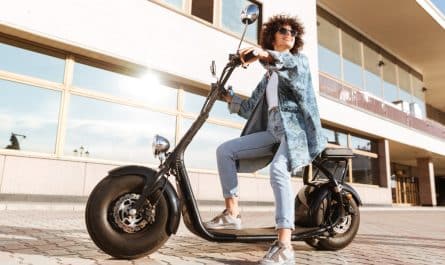Are you planning a long motorcycle trip? It’s an exciting adventure that requires good preparation. Whether you’re exploring unfamiliar roads or enjoying the thrill of riding long distances, it’s crucial that your bike is in top condition. Here are some practical tips to properly prepare your two-wheeler before hitting the road.
Checking the oil level and other vital fluids
Before any trip, it’s essential to check several things on your machine, including the oil level. You don’t want to risk a mechanical breakdown in the middle of nowhere. Make sure your engine oil is at the right level and clean. If necessary, do an oil change.
In addition to the engine oil, don’t forget to check the coolant if your bike has one, as well as the brake fluid. These fluids play a crucial role in the proper functioning of your machine and should be monitored regularly.
Brake Pad Inspection
Brake pads are another key component to inspect before you set off. Faulty brakes can turn a dream road trip into a nightmare. Check the thickness of the pads and replace them if they are too worn. It is good practice to plan to bring a spare pair, especially if you plan to travel a long distance.
Also, don’t forget to check the brake rotors. They should be smooth and free of cracks or splits. A quick glance can often prevent serious mechanical problems.
Motorcycle Chain Maintenance
Motorcycle chains play a vital role in transmitting power to the rear wheel. Before you set off, make sure the chain is properly tensioned and properly lubricated. A poorly maintained chain can cause a derailment or even damage other essential components.
It is advisable to clean the chain with a specific product and check its general condition. The links must not show signs of excessive wear or rust. If necessary, consider replacing the chain to avoid any unpleasant surprises during your trip.
Tip to extend chain life
For those who do a lot of dusty roads or in the rain, the ideal is to lubricate the chain after each wash or wet route. This maintains optimal flexibility and protects against premature wear.
Preparing the motorcycle: tires, pressure and wear
THE tires are literally the point of contact between you and the road. It is therefore imperative to check their condition and wear. Look for cuts, dents, or areas without a weave pattern. Replace any damaged tires immediately.
Do not neglect the tire pressure. This generally varies depending on the load; therefore consult the manufacturer’s recommendations. Good pressure not only ensures better grip but also optimized fuel consumption and less tire wear.
Functional controls and lighting
Proper preparation of the motorcycle also involves checking the various functional controls. Carefully test the headlights, turn signals, and all control buttons. L’lighting is vital, especially if you plan to ride at night. Check that bulbs are in good condition and that all lights are working properly.
Also make sure that the horn works well, as it can be very useful in certain driving situations. Never leave without these basic but essential checks.
Identity papers and legal documents
Have all your identity papers and up-to-date administrative documents are essential. This includes your driver’s license, motorcycle registration card, and insurance certificate. Make copies of these documents and keep them in a safe place, not far from you during the trip.
Always keep a digital version of these documents on your smartphone or in the cloud. In case of loss or theft, having access to a copy can make the process much simpler and faster.
Essential tools and equipment
Driving long distances means that you have to be prepared for various unforeseen situations. Always have a basic tool set including wrenches, screwdrivers, and pliers. Also add spare fuses and bulbs.
It is wise to include in your first aid kit some equipment such as a mini-pump, a puncture repair kit, and extra oil. A survival blanket, a first aid kit and a flashlight effectively complete this essential gear.
Safely Loading Luggage
The proper storage of your gear also plays a crucial role in the comfort and safety of your ride. Use side bags or a top case to distribute the weight evenly. Make sure nothing is dangerously overhanging the sides of your motorcycle and that everything is securely fastened.
Protect your gear from rain and bad weather by using waterproof bags or protective covers. Avoid overloading the motorcycle so as not to affect its handling and stability during demanding rides.
Planning and Itinerary
A good trip always starts with good planning. Map out your route in advance and locate gas stations, motorcycle repair shops, and rest stops. Having a reliable GPS or navigation app can go a long way in helping you stay on track.Don’t forget to schedule
regular breaks to rest, drink water and eat. Driving while tired not only increases the risk of an accident, but also reduces the enjoyment of your adventure. Final checklist before hitting the road
Checking the oil level and other vital fluids
- Checking brake pads and discs
- Maintenance and adjustment of motorcycle chains
- Tire inspection and pressure adjustment
- Complete test of functional controls and lighting
- Carry identity papers, driving license, motorcycle registration document, and insurance certificate
- Gathering the necessary tools and equipment
- Loading and securing baggage
- Detailed planning of the route and planned breaks
- Taking these precautions ensures that you will be prepared for various situations and will make your motorcycle trip much more enjoyable and safe. Have a good trip and enjoy the adventure!








